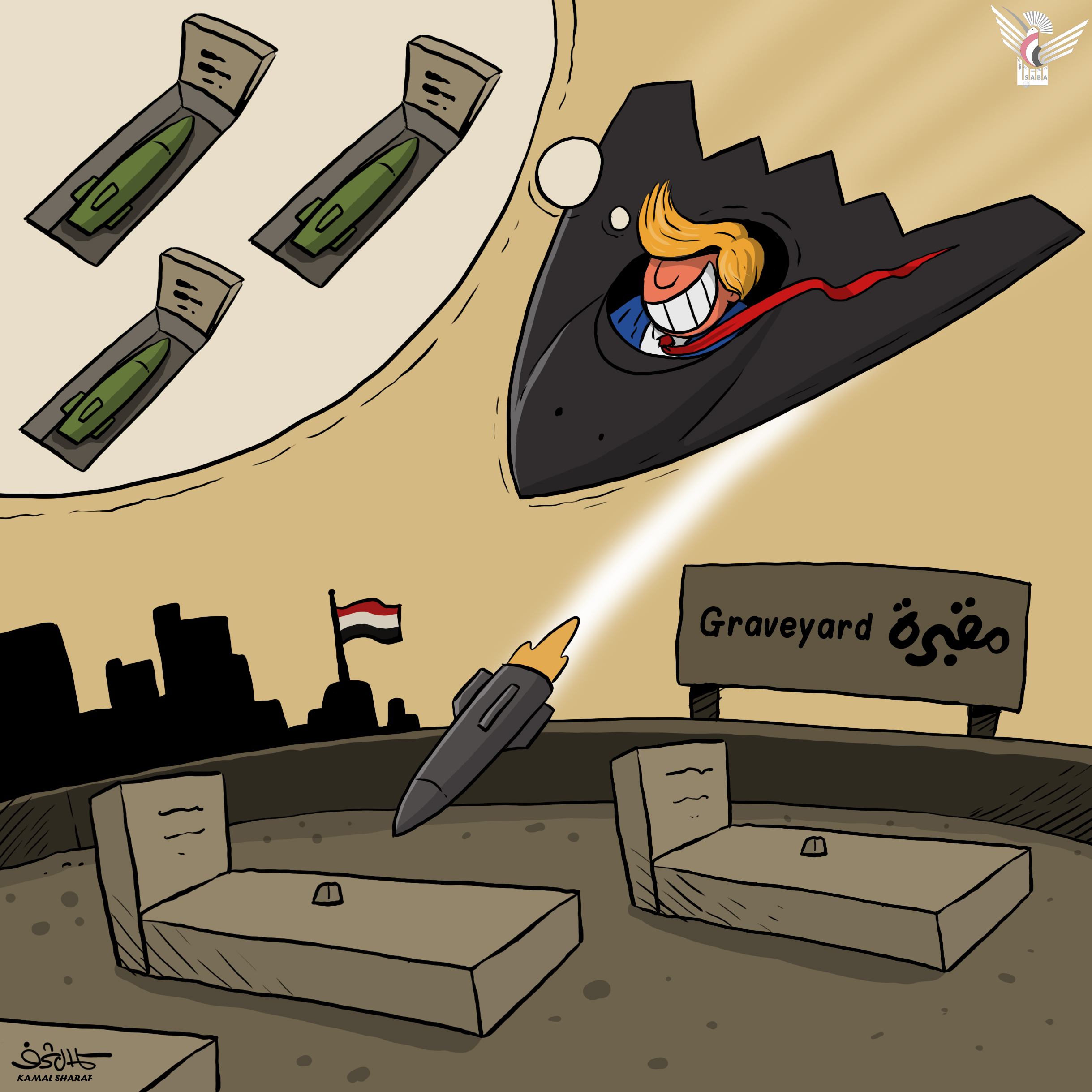SANA'A June 03. 2024 (Saba) - Observers and political analysts had differing interpretations of "Biden's proposal" aimed at halting aggression in Gaza and facilitating a prisoner exchange. Some perceived it as a capitulation to the Palestinian resistance, while others viewed it as a strategic move by the U.S. administration, especially following the perceived failures of the aggressor's military objectives.
In this context, political analysts suggested that the American offer aimed to exert pressure on both the Palestinian resistance and Arab parties, with an additional goal of advancing the normalization process with Arab countries. However, others argued that the proposal wasn't a result of American generosity but rather stemmed from Biden's electoral considerations, particularly in light of Netanyahu's perceived failure to achieve aggression goals against Gaza and the resilient stance of the Palestinian people.
According to observers, the American proposal, consisting of three stages, bears striking similarities to the Egyptian-Qatari proposal. This earlier plan, which was endorsed and amended by CIA Director William Burns, was accepted by Hamas and the Palestinian resistance. However, Netanyahu rejected it, opting instead for military action in the Battle of Rafah in pursuit of what he termed as an "overwhelming victory" and the recovery of prisoners through pressure on the resistance.
The timing of the release of the "Biden-Zionist proposal" seems to coincide with a deepening internal crisis within the Zionist leadership. There's been a notable increase in criticism directed at Netanyahu from various quarters, including security and military leaders, former ministers, and analysts. This criticism mainly revolves around the perceived failures in both security and economic management during the conflict. It appears that the intention behind this timing was to intensify pressure on Netanyahu, who has adamantly rejected any ceasefire until what he perceives as the complete achievement of the war's objectives, such as eliminating Hamas and preventing future conflicts like the one on October 7th, as well as securing the release of Israeli prisoners held by the resistance.
It appears that there's a growing consensus within the enemy's security and military institutions that the aggressive campaign in Gaza has reached a stalemate. They acknowledge that neither the elimination of Hamas nor the release of prisoners can be achieved without negotiation. Consequently, there's a call for an initiative prioritizing prisoner recovery. This move aims to pressure Netanyahu, caught between external American pressure and internal Zionist discontent, exacerbated by escalating protests from prisoner families and the public.
Observers view the American proposal with skepticism, recognizing potential risks. Despite the Palestinian resistance's vigilance, there's a concern that it may be manipulated into accepting the proposal, only to be blamed if it fails. Although the resistance welcomes the initiative, it's hesitant to respond until approved by the Zionist entity, anticipating Netanyahu's potential rejection, similar to the Egyptian-Qatari proposal.
It's important to note that the proposed initiative, focusing on achieving sustainable calm, doesn't aim to end the state of war outright. Instead, it suggests initiating negotiations for a temporary ceasefire lasting six weeks, with the possibility of extension if ceasefire conditions aren't fully negotiated. However, there's concern that Netanyahu may exploit loopholes to evade the agreement, potentially violating the Palestinian resistance while reclaiming a significant portion of prisoners. Additionally, the initiative doesn't address critical issues like the fate of border crossings such as Rafah, Philadelphia, or Netzarim Junction, nor does it specify the extent of Zionist withdrawal.
Analysts emphasize the importance of scrutinizing the details, as they believe this agreement reflects the complexities faced by both Zionist and American parties. Biden's crisis deepened following the student "uprising," diminishing his prospects for reelection. Meanwhile, Netanyahu, amidst internal and external crises, fell short of achieving strategic objectives. Despite extremist efforts to eradicate the resistance and Hamas, prisoner recovery remained elusive, and residents of settlements around Gaza didn't return to secure conditions. As the war reaches a stalemate, the occupation army faces increased destruction, erosion, and a loss of deterrence power.
Observers and political analysts emphasize the need for caution in handling a complex initiative fraught with pitfalls and errors. They suggest that embracing it based on meeting the resistance's conditions and challenging the enemy to reject it requires the Hamas movement and the resistance to approach the situation with intelligence and vigilance, prioritizing their own interests.
Some analyses suggest that America's bias towards the Zionist entity remains unchanged. However, they argue that this proposal aims to rescue the entity from imminent defeat and the escalating military stalemate in Gaza. They note a pattern of shifting American positions on the battlefield since October 7, often favoring Netanyahu's interests.
Palestinian writer and political analyst Yasser Al-Zaatara emphasized in his press statements that the recent developments were not driven by American generosity but rather by Biden's electoral concerns and the deep state's desire for his victory over Trump. He noted that prior to and following this, there was a growing American (and significant Zionist elite) acknowledgment of failure. The invaders proved incapable of achieving their objectives through military means, despite Netanyahu's attempts to portray entering most of Rafah as a sign of "absolute victory," while losses mounted.
Al-Zaatara remarked, "Indeed, these developments were not a consequence of previous actions but rather the outcome of heroic resistance (bolstered by the legendary steadfastness of the people), which positioned Palestine at the forefront, stunning the Zionists who had previously believed in their ability to resolve the issue and dominate the entire Middle East."
Palestinian journalist and political analyst Mustafa Ashour emphasized in his statements to the press that Biden's speech (which was unusually detailed) was a confirmation of the victory of Palestinian resistance and the resilience of the people of Gaza.
On the other hand, Palestinian political science professor Ahmed Ben Rashid Ben Said viewed Biden's proposal as a Zionist-American surrender to Hamas and Palestinian resistance.
Ben Said stated in a press release: "The plan presented by Biden on Friday to cease fire in Gaza, and described as a Zionist proposal, demands Hamas to accept it. These are the same demands previously presented by Hamas. Instead of admitting to surrendering to the resistance, they attribute the plan to themselves, and urge Hamas to accept it in a desperate attempt to save face."
Media figure Ahmed Mansour affirmed that Biden's proposal to halt the war in Gaza isn't solely an American proposition but a Zionist-French-British-Western one. All allies of the Zionist entity feel the imminent threat to this artificial entity due to the ongoing war, with Netanyahu dragging them all into a deep swamp. They want to save this entity, but Netanyahu will continue to procrastinate and evade until he falls along with them.
Earlier today, during a joint press conference with his Spanish counterpart, Egyptian Foreign Minister Sameh Shoukry conveyed a statement from Hamas, saying: "The proposal presented by US President Joe Biden is 'positive'." He added: "We are now awaiting (Israel)."
Shoukry stated: "The three countries are overseeing ongoing negotiations to reach a ceasefire, allow aid, and prevent the liquidation of the Palestinian cause through displacement." He indicated that "the current American proposal is worthy of acceptance, as it leads to a ceasefire and stops the ongoing damage and killing of the Palestinian people in Gaza."
He affirmed that the proposal contains guaranteeing elements "for a comprehensive ceasefire, hostage release, and aid entry in quantities needed by the Palestinian people."
It's worth noting that the "Biden initiative" is a result of unprecedented Palestinian resilience and popular support despite significant sacrifices. While Hamas and Palestinian resistance welcome the American-Zionist initiative, caution must be exercised due to Netanyahu's deceitfulness. The American administration is even less trustworthy.
H.H
resource : Saba

| more of (Reports) |




